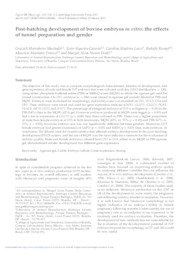Post-hatching development of bovine embryos in vitro: the effects of tunnel preparation and gender.
Post-hatching development of bovine embryos in vitro: the effects of tunnel preparation and gender.
Author(s): MACHADO, G. M.; CAIXETA, E. S.; LUCCI, C. M.; RUMPF, R.; FRANCO, M. M.; DODE, M. A. N.
Summary: The objective of this study was to compare morphological characteristics, kinetics of development, and gene expression ofmale and female IVP embryos thatwere cultured until day (D)15 (fertilization = D0), using either phosphate-buffered saline (PBS) or Milli-Q water (MQW) to dilute the agarose gel used for tunnel construction. On D11, embryos (n = 286) were placed in agarose gel tunnels diluted in PBS and MQW. Embryos were evaluated for morphology, and embryo size was recorded on D11, D12.5, D14 and D15. Then, embryos were sexed and used for gene expression analyses (G6PD, GLUT1, GLUT3, PGK1, PLAC8, KRT8, HSF1 and IFNT). The percentage of elongated embryos at D15 was higher (p < 0.05) in the PBS (54%) than in theMQW(42%) gel. However, embryos produced inMQWwere bigger (p < 0.05) and had a lower expression of GLUT1 (p = 0.08) than those cultured in PBS. There was a higher proportion of male than female embryos at D15 in both treatments, MQW(65% vs. 35%; p < 0.05) and PBS (67% vs. 33%; p < 0.05); however, embryo size was not signi?cantly different between genders. Moreover, D15 female embryos had greater expression of G6PD (p = 0.05) and KRT8 (p = 0.03) than male embryos. In conclusion, the diluent used for tunnel construction affected embryo development in the post-hatching development (PHD) system, and the use ofMQWwas the most indicative measure for the evaluation of embryo quality. Male and female embryos cultured from D11 to D15, either in an MQW or PBS agarose gel, demonstrated similar development but different gene expression.
Publication year: 2011
Types of publication: Journal article
Keywords: Cultura do embrião, Gado, Sexagem
Observation
Some of Embrapa's publications are published as ePub files. To read them, use or download one of the following free software options to your computer or mobile device. Android: Google Play Books; IOS: iBooks; Windows and Linux: Calibre.
Access other publications
Access the Agricultural Research Database (BDPA) to consult Embrapa's full library collection and records.
Visit Embrapa Bookstore to purchase books and other publications sold by Embrapa.

